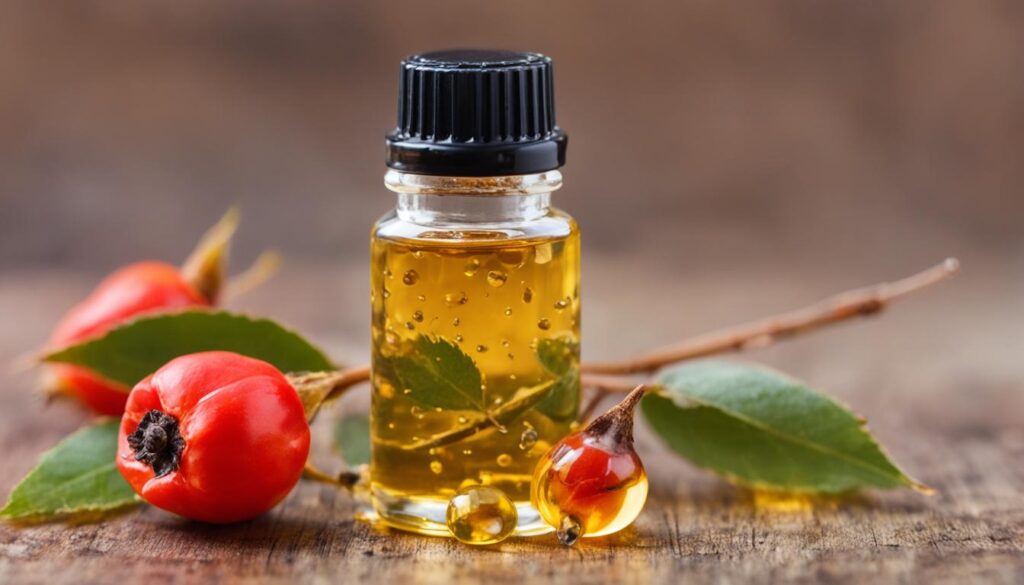Rosehip oil is a versatile natural ingredient that offers numerous benefits for the skin, hair, and overall wellness. It is derived from the fruit and seeds of the rosehip plant and is rich in essential fatty acids and vitamins. In this comprehensive guide, I will explore the history, properties, and key components of rosehip oil, as well as its various uses in culinary, personal care, and household products. We will delve into the benefits and applications of rosehip oil and provide usage tips and cautions. Additionally, I will discuss how to select the best quality rosehip oil and store it for maximum effectiveness.
Key Takeaways:
- Rosehip oil is a versatile natural ingredient that offers numerous benefits for the skin, hair, and overall wellness.
- It is derived from the fruit and seeds of the rosehip plant and is rich in essential fatty acids and vitamins.
- Rosehip oil can be used in culinary, personal care, and household products, providing a wide range of applications.
- Topical use of rosehip oil can improve skin texture, reduce acne and scars, and promote overall skin health.
- Proper storage and selection of high-quality rosehip oil are crucial for maintaining its effectiveness.
The Origins of Rosehip Oil

Rosehip oil has a long history of medicinal use, dating back to ancient times. It is believed to have been used by the Ancient Egyptians for its therapeutic properties. The oil is derived from the fruit and seeds of the wild rose bush, primarily the Rosa canina species. These plants are predominantly grown in the Andes Mountains, although they can also be found in Africa and Europe. Rosehips are known for their high vitamin C content and have been used for their nutritional and medicinal benefits for centuries.
Did you know? Rosehip oil was first extracted by the ancient Egyptians and used for its therapeutic properties.
| Vitamin C Content | Growth Locations | Historical Use |
|---|---|---|
| High | Andes Mountains, Africa, Europe | Ancient Egyptians |
The Ancient Egyptians and Rosehip Oil
“The ancient Egyptians were pioneers in utilizing rosehip oil for its therapeutic properties.”
The Properties and Key Components of Rosehip Oil

Rosehip oil is a natural ingredient that offers a multitude of benefits for skincare and overall wellness. Packed with essential components, this oil is a powerhouse for nourishing and enhancing the health of your skin.
The Key Components of Rosehip Oil
Rosehip oil is rich in several key components that contribute to its effectiveness. These include:
| Key Components | Benefits |
|---|---|
| Vitamin C | Provides antioxidant protection, boosts collagen production, and brightens the skin |
| Essential Fatty Acids (such as oleic acid, linoleic acid, and gamma linolenic acid) | Help maintain skin hydration, improve skin elasticity, and promote a healthy skin barrier |
| Phenols | Have antibacterial and antifungal properties, helping to keep the skin clear and healthy |
| Vitamin A | Assists in skin cell regeneration, reducing the appearance of fine lines, wrinkles, and scars |
| Vitamin F | Nourishes and moisturizes the skin, leaving it soft, supple, and radiant |
Together, these components make rosehip oil a potent ingredient for skincare, providing a wide array of benefits.
Properties of Rosehip Oil
The properties of rosehip oil further enhance its effectiveness in promoting healthy skin. These properties include:
“Rosehip oil is a versatile and effective natural ingredient that offers numerous benefits for the skin. Its high content of vitamin C, essential fatty acids, and phenols make it a powerful ally for maintaining skin health and addressing various concerns.”
Rosehip oil’s properties include:
- Antioxidant: Protects the skin from free radicals, preventing premature aging
- Moisturizing: Locks in moisture, keeping the skin hydrated and supple
- Anti-inflammatory: Soothes and calms irritated skin, reducing redness and inflammation
- Regenerative: Stimulates skin cell regeneration, promoting a youthful and glowing complexion
- Emollient: Softens and smoothes the skin, improving texture and overall appearance
With its unique combination of key components and properties, rosehip oil is a valuable asset in your skincare routine.
Now that we understand the properties and key components of rosehip oil, let’s explore its various uses in culinary, personal care, and household products.
Culinary and Natural Products that Utilize Rosehip Oil

Rosehip oil is not only beneficial for skincare but also finds its place in culinary and natural products. The fruit of the rosehip plant can be brewed as tea or used to make homemade rosehip oil. It is a popular ingredient in herbal infusions, jams, jellies, and syrups. Culinary uses of rosehip oil can add flavor and nutrients to various dishes. In natural products, rosehip oil is commonly incorporated into creams, powders, and teas for its skin healing and moisturization properties.
Culinary Uses of Rosehip Oil
| Culinary Application | Description |
|---|---|
| Herbal infusions | Used as an ingredient in teas and tisanes for its aromatic profile and potential health benefits. |
| Jams and jellies | Added to preserve recipes for a unique flavor and added nutritional value. |
| Syrups and sauces | Used to enhance the taste and nutritional content of syrups and sauces, such as salad dressings or dessert toppings. |
| Flavorful oils | Infused with rosehip oil to create unique culinary creations. |
Note: The above table provides an overview of the various culinary applications of rosehip oil. These uses contribute to the taste, aroma, and nutritional benefits of different dishes.
Topical Uses of Rosehip Oil for Skincare
Rosehip oil is a powerhouse ingredient when it comes to skincare. Its numerous benefits make it a popular choice for improving skin texture, reducing acne, scars, and wrinkles, and promoting overall skin health. The antioxidant properties of rosehip oil, combined with its essential fatty acids and vitamins, make it an effective solution for addressing various skin concerns.
When it comes to using rosehip oil for skincare, there are multiple options. You can apply it directly to your face and body, using gentle, circular motions to massage it into your skin. Alternatively, you can incorporate rosehip oil into your daily skincare routine by using products that contain this beneficial ingredient.
The key to rosehip oil’s effectiveness lies in its properties. It is packed with essential fatty acids like omega-3, omega-6, and omega-9, which help nourish the skin and improve its moisture retention. These fatty acids also aid in reducing inflammation and calming irritated or sensitive skin.
Rosehip oil is particularly beneficial for acne-prone skin. It contains linoleic acid, which helps regulate sebum production and unclog pores, thereby reducing the occurrence of breakouts. The oil’s antibacterial properties can also aid in fighting acne-causing bacteria, resulting in clearer, healthier skin.
Another notable benefit of rosehip oil is its ability to diminish the appearance of scars and wrinkles. The high content of vitamins A and C in rosehip oil helps promote collagen production, which contributes to smoother, more youthful-looking skin. Regular use of rosehip oil can help fade scars and plump up fine lines and wrinkles, giving your skin a revitalized and rejuvenated appearance.
“Rosehip oil is rich in antioxidants and fatty acids that support healthy skin. Its exceptional moisturizing properties can help improve skin texture and reduce the appearance of acne, scars, and wrinkles.”
Rosehip Oil for Different Skin Types
Rosehip oil is suitable for all skin types, including dry, oily, and combination skin. Its lightweight texture allows for quick absorption, making it suitable for those with oily or acne-prone skin. For dry or sensitive skin, applying rosehip oil can provide much-needed hydration and nourishment.
It is important to note that while rosehip oil is generally safe for most individuals, it is advisable to perform a patch test before using it for the first time. This helps identify any potential skin allergies or sensitivities.
How to Incorporate Rosehip Oil into your Skincare Routine
There are several ways to incorporate rosehip oil into your skincare routine to reap its benefits:
- As a facial oil: Apply a few drops of rosehip oil to your cleansed face and neck, gently massaging it in until fully absorbed. You can use it in the morning and evening or as needed.
- Mix with moisturizer: Add a few drops of rosehip oil to your favorite moisturizer to enhance its nourishing properties. This can provide an extra boost of hydration and help seal in moisture.
- In homemade masks: Combine rosehip oil with other natural ingredients, such as honey or yogurt, to create a DIY face mask. Leave it on for 15-20 minutes before rinsing off for soft, supple skin.
Remember to store your rosehip oil in a cool, dark place to protect it from light exposure and preserve its efficacy.
| Benefits of Rosehip Oil for Skincare | Usage |
|---|---|
| Improves skin texture | Apply a few drops of rosehip oil directly to the skin or incorporate it into skincare products |
| Reduces the appearance of acne | Massage rosehip oil onto the affected areas or use skincare products containing rosehip oil |
| Fades scars and wrinkles | Apply rosehip oil directly to scars and wrinkles or use skincare products enriched with rosehip oil |
| Promotes overall skin health | Regularly use rosehip oil in your skincare routine |
Benefits and Application of Rosehip Oil for Hair

When it comes to promoting hair health, rosehip oil proves to be more than just a skincare wonder. Packed with vitamins and essential fatty acids, this natural ingredient provides substantial nourishment to the scalp, strengthens hair strands, and improves overall hair quality. Rosehip oil can effectively reduce frizz, boost shine, and moisturize dry hair, making it a valuable addition to your hair care routine.
One of the primary benefits of rosehip oil for hair is its ability to nourish the scalp. The vitamins and essential fatty acids it contains provide moisture and nutrients to the scalp, promoting a healthy environment for hair growth. By keeping the scalp hydrated and balanced, rosehip oil helps reduce common scalp issues such as dryness, itchiness, and dandruff.
Rosehip oil also helps in strengthening hair strands. Its fatty acids, including omega-3 and omega-6, help fortify the hair shafts, reducing breakage and promoting healthier, more resilient hair. Regular use of rosehip oil can make your hair less prone to damage and enhance its overall strength and thickness.
In addition to its nourishing and strengthening properties, rosehip oil can effectively tackle frizz and add shine to your hair. The lightweight consistency of the oil allows it to penetrate the hair shaft, nourishing it from within and sealing the cuticles to control frizz. This results in smoother, shinier hair that looks and feels healthier.
How to Use Rosehip Oil for Hair
There are several ways to incorporate rosehip oil into your hair care routine. One option is to apply a few drops of rosehip oil directly to your scalp, focusing on areas that need extra care or attention. Gently massage the oil into your scalp, then distribute the remaining oil through your hair strands. Leave it on for a few hours or overnight before washing it out with a mild shampoo.
Another way to enjoy the benefits of rosehip oil is to mix it with your favorite hair care products. Add a few drops of rosehip oil to your shampoo, conditioner, or hair mask to enhance their moisturizing and nourishing properties. This helps infuse your hair care routine with the goodness of rosehip oil, providing ongoing benefits with every use.
Remember, a little goes a long way with rosehip oil, so start with a small amount and adjust as needed. Aim for consistent use to experience the full benefits of this natural hair care treasure.
Adding rosehip oil to your hair care routine can yield impressive results. Whether you want to nourish your scalp, strengthen your hair, tame frizz, or add shine, rosehip oil offers a natural and effective solution. Discover the power of rosehip oil and unlock the potential for healthier, more beautiful hair.
Practical Household Uses for Rosehip Oil

Rosehip oil’s versatility extends beyond skincare and hair care. It can also be utilized for various household purposes. The antibacterial and antifungal properties of rosehip oil make it effective for cleaning and disinfecting surfaces. It can be added to DIY cleaning solutions, used as a natural air freshener, or incorporated into homemade soaps and candles. Rosehip oil provides a safe and natural alternative for maintaining a clean and healthy home environment.
Cleaning and Disinfecting
Rosehip oil is a natural cleanser and disinfectant, making it an excellent choice for household cleaning. It can be added to homemade cleaning solutions to effectively remove dirt, grime, and stains. Rosehip oil’s antibacterial and antifungal properties help eliminate harmful bacteria and prevent the growth of mold and mildew. Whether you’re cleaning countertops, floors, or bathroom fixtures, rosehip oil can provide a safe and natural way to keep your home clean.
Natural Air Freshener
Instead of using chemical-laden air fresheners, consider using rosehip oil as a natural alternative. Its pleasant aroma can freshen up your living space without the use of synthetic fragrances. You can make your own air freshener by adding a few drops of rosehip oil to a spray bottle filled with water. Simply spritz the mixture around your home to create a clean and inviting atmosphere.
Homemade Soaps and Candles
Rosehip oil can be incorporated into your DIY soap and candle-making projects. Its moisturizing properties help nourish the skin when used in soaps, while its natural fragrance adds a soothing aroma. Adding rosehip oil to your homemade candles can also enhance their scent and create a calming ambiance in your home.
With its various household uses, rosehip oil proves to be a valuable addition to your cleaning and self-care routines. By harnessing its natural properties, you can create a healthy and harmonious living environment without the need for harsh chemicals. Experiment with different ways to incorporate rosehip oil into your household products and experience the benefits it provides.
Usage Tips and Cautions for Rosehip Oil

While rosehip oil offers numerous benefits, it is important to use it properly and be aware of potential cautions. Here are some usage tips and precautions to keep in mind when incorporating rosehip oil into your skincare routine:
- Perform a patch test: Before using rosehip oil on your face or body, perform a patch test on a small area of skin to check for any allergic reactions. Apply a small amount of diluted oil and wait 24 hours to observe any adverse effects.
- Store in a dark glass bottle: To protect rosehip oil from light exposure and maintain its quality, it is recommended to store it in a dark glass bottle. This helps prevent oxidation and extends the shelf life of the oil.
- Avoid internal use: Rosehip oil is not recommended for internal use. It is intended for external application only. If ingested, it may cause digestive discomfort.
- Keep out of reach of children: Ensure that rosehip oil is kept out of reach of children to prevent accidental ingestion. Although it is generally safe for topical use, ingestion can have adverse effects.
- Consult your healthcare provider: If you have specific medical conditions or are taking certain medications, it is advisable to consult your healthcare provider before using rosehip oil. They can provide guidance based on your individual circumstances.
By following these usage tips and cautions, you can safely incorporate rosehip oil into your skincare routine and enjoy its numerous benefits. Remember to prioritize your skin’s health and always use products responsibly.
Benefits and Cautions of Rosehip Oil
| Benefits | Cautions |
|---|---|
|
|
Selecting the Best Quality Rosehip Oil

When it comes to rosehip oil, selecting a high-quality product is essential to ensure its efficacy and safety. With the wide range of options available in the market, it’s important to know what to look for in order to make an informed choice.
Choosing Reputable Manufacturers
Start by looking for rosehip oil from reputable manufacturers that prioritize organic and sustainable practices. These manufacturers are committed to sourcing high-quality rosehips and using environmentally-friendly production methods, ensuring that their products are of the best quality.
Opt for Cold-Pressed and Organic
Cold-pressed and organic rosehip oil is generally considered the best choice. Cold-pressing involves extracting oil from the rosehips without using heat, which helps to preserve the oil’s natural nutrients and properties. Organic rosehip oil is made from rosehips that are grown without the use of harmful pesticides or chemicals, ensuring a pure and clean product.
Pay Attention to Extraction Process and Ingredients
Take a closer look at the extraction process used to obtain the rosehip oil. The extraction method should be clearly stated on the product label or website. Additionally, check for any additional ingredients used in the formulation. Look for products with minimal or no added ingredients, as these are more likely to be pure rosehip oil with maximum benefits.
Read Customer Reviews and Certifications
Customer reviews can provide valuable insights into the quality and effectiveness of a rosehip oil product. Take the time to read reviews from verified buyers to get an idea of other users’ experiences. Additionally, look for certifications from trusted sources, such as organic certifications or awards, to further validate the product’s quality.
| Key Considerations for Selecting High-Quality Rosehip Oil |
|---|
| Choose rosehip oil from reputable manufacturers |
| Opt for cold-pressed and organic rosehip oil |
| Pay attention to the extraction process and additional ingredients |
| Read customer reviews from verified buyers |
| Look for certifications from trusted sources |
By following these guidelines and taking the time to select the best quality rosehip oil, you can ensure that you are getting a product that delivers maximum benefits for your skincare and wellness routine.
Proper Storage of Rosehip Oil
Properly storing rosehip oil is crucial to maintain its freshness and maximize its benefits. Here are some guidelines to ensure the longevity of your rosehip oil:
- Store in a cool, dark place: Rosehip oil should be kept away from direct sunlight and heat, as these can degrade the oil and reduce its effectiveness. Find a cool, dark spot in your home to store your bottle of rosehip oil.
- Consider refrigeration: If you live in a warm climate or want to further extend the shelf life of your rosehip oil, consider refrigerating it. The cool temperature will help preserve the oil’s quality and potency.
- Ensure tight sealing: Prevent oxidation and maintain the freshness of your rosehip oil by ensuring the bottle is tightly sealed. This will prevent air from entering and potentially spoiling the oil.
- Follow expiration dates: Always check the expiration date indicated on the packaging of your rosehip oil. Expired or rancid oil should be discarded to avoid any adverse effects.
Note: It is important to remember that rosehip oil is for external use only and should be kept out of reach of children. If you have any specific medical conditions or are on certain medications, it is advisable to consult with your healthcare provider before using rosehip oil.
The Verdict on Rosehip Oil Uses and Benefits
Rosehip oil is a versatile and beneficial natural ingredient with a wide range of uses and benefits. Its properties make it an excellent choice for promoting health and wellness, whether used topically for skincare, hair care, or incorporated into culinary and household products.
When it comes to skincare, rosehip oil has been praised for its ability to improve skin texture, reduce acne and scars, and diminish wrinkles. Its antioxidant properties, essential fatty acids, and vitamins make it an effective ingredient for addressing various skin concerns. It can be applied directly to the face and body or used in skincare products.
Not only does rosehip oil benefit the skin, but it is also beneficial for hair. It nourishes the scalp, strengthens hair strands, reduces frizz, and adds shine. By incorporating rosehip oil into hair care products like shampoos and conditioners, you can enhance overall hair quality.
In addition to personal care, rosehip oil finds its place in culinary and natural products. The fruit of the rosehip plant can be used to make herbal infusions, jams, and jellies, adding flavor and nutrients to various dishes. It can also be incorporated into creams, powders, and teas for its skin healing and moisturizing properties.
However, it is important to use rosehip oil responsibly and be aware of potential allergic reactions. Before using it, perform a patch test and consult a healthcare provider if you have specific medical conditions or are on medication. Proper storage, such as keeping it in a cool, dark place and tightly sealed, is essential to maintain its freshness and efficacy.
Overall, rosehip oil is a valuable addition to any natural beauty and wellness routine, offering numerous benefits for the skin, hair, and overall health. By making informed choices and incorporating rosehip oil into your daily routine, you can experience its full range of uses and enjoy the benefits it has to offer.
FAQ
What are the benefits of using rosehip oil?
Rosehip oil offers numerous benefits for the skin, hair, and overall wellness. It is rich in essential fatty acids and vitamins, which help improve skin texture, reduce the appearance of acne, scars, and wrinkles, and promote overall skin health. It also nourishes the scalp, strengthens hair strands, and improves hair quality.
How can I use rosehip oil for skincare?
Rosehip oil can be applied topically to the face and body to improve skin health. It can be used directly on the skin or incorporated into skincare products like creams or serums. Apply a few drops of rosehip oil and massage it into the skin until absorbed. It can be used as a moisturizer, spot treatment, or added to face masks and scrubs.
Can rosehip oil be used for hair care?
Yes, rosehip oil can be used for hair care. Apply a few drops of rosehip oil to the scalp and massage it in to nourish the scalp and improve hair quality. It can also be added to shampoos, conditioners, and hair masks to moisturize dry hair, reduce frizz, and add shine.
Are there any household uses for rosehip oil?
Yes, rosehip oil can be used for various household purposes. Its antibacterial and antifungal properties make it effective for cleaning and disinfecting surfaces. It can be added to homemade cleaning solutions, used as a natural air freshener, or incorporated into homemade soaps and candles.
Are there any precautions to take when using rosehip oil?
Before using rosehip oil topically, it is advisable to perform a patch test to check for any allergic reactions. Rosehip oil should be stored in a dark glass bottle to protect it from light exposure. It is not recommended for internal use and should be kept out of reach of children. Individuals with specific medical conditions or on certain medications should consult their healthcare provider before using rosehip oil.
How can I select the best quality rosehip oil?
When choosing rosehip oil, look for products from reputable manufacturers that prioritize organic and sustainable practices. Cold-pressed and organic rosehip oil is generally considered the best option. Pay attention to the extraction process and any additional ingredients used in the formulation. Read customer reviews and opt for products that have positive feedback and certifications from trusted sources.
How should I store rosehip oil?
To maintain the freshness and effectiveness of rosehip oil, store it in a cool, dark place away from direct sunlight. Consider refrigerating rosehip oil, especially in warm climates, to further extend its shelf life. Ensure the bottle is tightly sealed to prevent oxidation. Follow the expiration date indicated on the packaging and discard any old or rancid oil.






